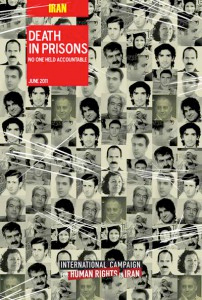به زبان فارسی
PICTORY
LATEST MUSIC
SEARCH
Death trap
by Hadi Ghaemi
26-Jun-2011
Iran’s pattern of prison abuse and neglect demonstrates that the lives of prisoners of conscience are at risk, the International Campaign for Human Rights in Iran said, with the publication of a new report, Death in Prison: No One Held Accountable. The Campaign holds Iranian authorities at the highest levels accountable for the health and well-being of eighteen prisoners of conscience now on their sixth day of a hunger strike.
“Iranian prisons are a death trap for prisoners of conscience,” said Aaron Rhodes, a spokesperson for the Campaign. “Officials must change the culture of unchecked impunity in Iranian prisons and give all prisoners the protections they are promised under international law.”
The Persian-language report documents the deaths of 17 political prisoners and prisoners of conscience who have died while in custody in Iranian prisons since 2003, allegedly due to torture, medical neglect, and misconduct of prison authorities. (English Summary)
Six of the prisoners were detained and died after the 2009 election and the ensuing crackdown on government critics and political opponents. No one has yet been held accountable, despite the fact that in all these instances, family members or lawyers of the prisoners have alleged that authorities were responsible for the deaths due to their physical abuse of the inmate or inadequate medical attention.
In all the cases detailed in the report, Iranian officials never provided full or compelling accounts for the prisoners’ deaths. Authorities failed to launch full or independent investigations in most instances. In several cases, authorities even denied lawyers and family members access to details about the prisoner’s death, such as autopsy reports, and did not allow lawyers or family members to file grievances. In the high profile case of Canadian-Iranian journalist, Zahra Kazemi, prosecutors did bring criminal charges against alleged perpetrators, but only against low-level prison guards who were later acquitted.
The Campaign believes the number of deaths caused by official wrongdoing would be greater than the 17 published in the report if undocumented cases and the cases of ordinary non-political inmates were accounted for.
The Campaign’s report comes out five days after twelve prominent prisoners of conscience commenced a hunger strike protesting the recent deaths of two prisoners, women’s rights activist Haleh Sahabi, and dissident journalist, Hoda Saber. On 23 of June, six more prominent prisoners of conscience have joined the protest bring the number of hunger striking prisoners to eighteen. These men are journalist Kayvan Samimi, journalist Issa Saharkhiz, journalist Massoud Bastani, political activist Heshmatollah Tabarzadi, human rights defender Jafar Eghdami, and student activist Ali Ajami.
Sahabi died from a heart attack while on furlough, when security forces raided the funeral of her father. Saber died of a heart attack while on a hunger strike. Family members and other prisoners have alleged his death was linked to physical abuse and the failure of prison officials to transfer him to a hospital in a timely manner.
Nobel Peace Prize Laureate, Shirin Ebadi, and numerous human rights organizations have expressed concern for the well-being of the hunger striking prisoners of conscience. On 22 June, authorities moved two of the hunger striking prisoners, 65-year-old opposition figure Abolfazl Ghadyani, and student activist Abdollah Momeni, to Evin Prison’s clinic to receive treatment for their deteriorating health, according to Kalame, an opposition news website.
“Authorities must do what they can to safeguard the well-being of these hunger striking prisoners,” Rhodes concluded. “The tragic circumstances that led to the deaths of Zahra Kazemi, Hoda Saber, and others, must not be revisited.”
The Campaign calls for Iranian officials to reopen the cases detailed in Death in Prison: No One Held Accountable, urges authorities to launch independent investigations into the recent deaths of Sahabi and Saber, and for the responsible persons to be prosecuted and held accountable.
International Campaign for Human Rights in Iran. For interviews or more information: Hadi Ghaemi, in New York: +1 917-669-5996 == Aaron Rhodes, in Hamburg: +49 170-323-8314. Listen to the Campaign's Weekly Iran Rights Podcast. For the latest human rights developments in Iran visit the Campaign’s website
| Recently by Hadi Ghaemi | Comments | Date |
|---|---|---|
| Every Eight Hours | 63 | Jan 16, 2011 |
| Guilty as Charged | 15 | Nov 19, 2010 |
| Where's the UN High Commissioner? | 12 | Nov 05, 2010 |
RECENT COMMENTS
IRANIANS OF THE DAY
| Person | About | Day |
|---|---|---|
| نسرین ستوده: زندانی روز | Dec 04 | |
| Saeed Malekpour: Prisoner of the day | Lawyer says death sentence suspended | Dec 03 |
| Majid Tavakoli: Prisoner of the day | Iterview with mother | Dec 02 |
| احسان نراقی: جامعه شناس و نویسنده ۱۳۰۵-۱۳۹۱ | Dec 02 | |
| Nasrin Sotoudeh: Prisoner of the day | 46 days on hunger strike | Dec 01 |
| Nasrin Sotoudeh: Graffiti | In Barcelona | Nov 30 |
| گوهر عشقی: مادر ستار بهشتی | Nov 30 | |
| Abdollah Momeni: Prisoner of the day | Activist denied leave and family visits for 1.5 years | Nov 30 |
| محمد کلالی: یکی از حمله کنندگان به سفارت ایران در برلین | Nov 29 | |
| Habibollah Golparipour: Prisoner of the day | Kurdish Activist on Death Row | Nov 28 |




Dear Hadi, thanks for writing about this very important subject
by Anahid Hojjati on Sun Jun 26, 2011 07:19 PM PDTWe cannot allow death of political prisoners continue like this. Thanks for bringing attention to plight of these prisoners of conscience.